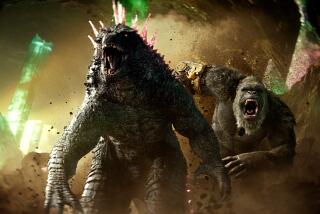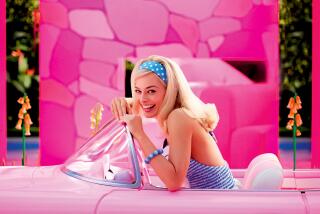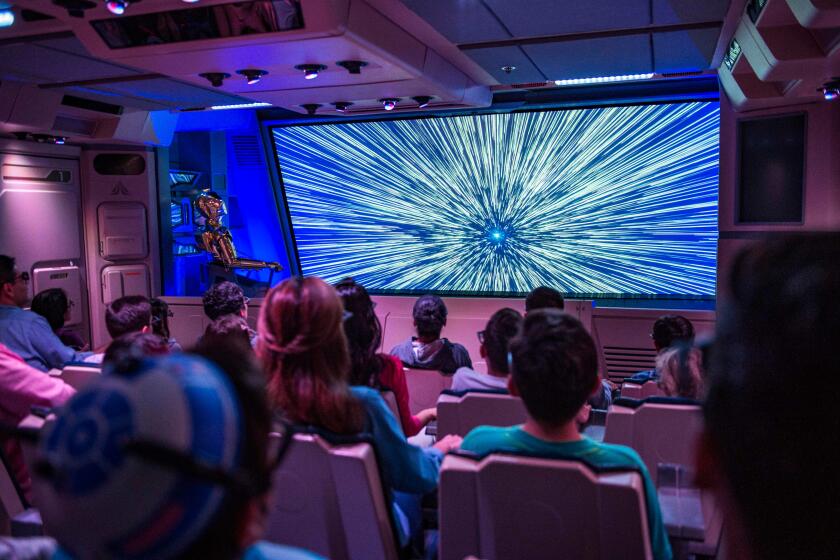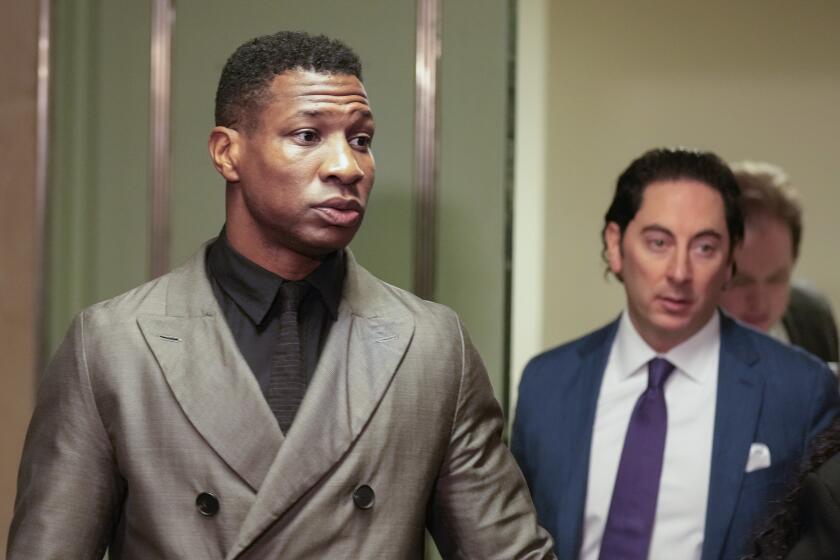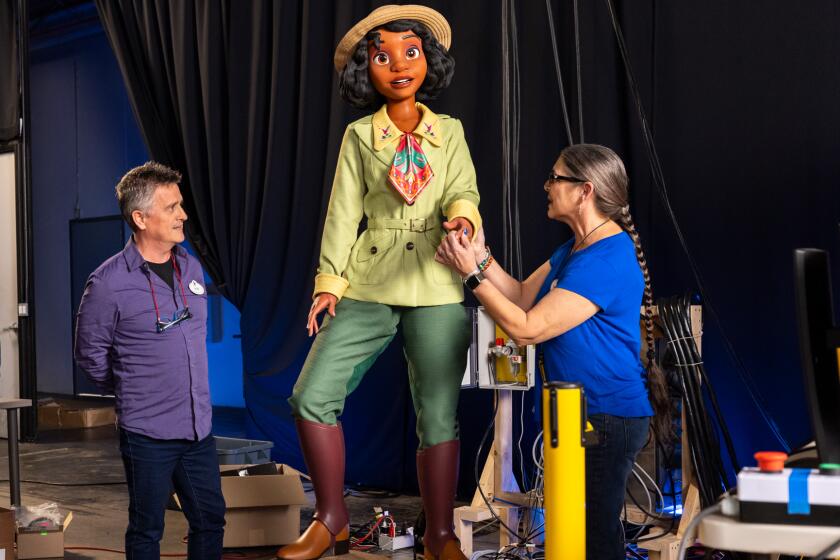Analysis: ‘Jurassic World’ battles sexism claims, in heels
“Jurassic World” may have had a record-setting box office opening, but claims of sexism are chasing after this movie like a giant T. rex. For a film that intentionally surrounds itself with scads of glorious female dinosaurs, many accuse director Colin Trevorrow’s “Jurassic” of having surprisingly little idea what to do with a human woman.
A lot of the fingers point at the film’s depiction of leading lady Claire (Bryce Dallas Howard), the no-nonsense corporate head and manager of the movie’s titular dinosaur park. Despite what the copious posters of motorcycle-riding Chris Pratt in a raptor pack suggest, Claire is also a lead in this film. And even though she’s a woman in charge of a multibillion-dollar company, film critics, culture writers and even major movie directors seem frustrated with how “Jurassic World” handles her incompetence, her childlessness and her high heels.
Director Joss Whedon struck the first blow before “Jurassic World’s” premiere, commenting on Twitter that the first, dialogue-heavy clip between Claire and Indiana Jones-esque raptor wrangler Owen (Pratt) was “70’s era sexist.” (Whedon later told Variety he regretted the statement and deleted his Twitter account entirely, though not over this matter.)
We asked Trevorrow what he thought of Whedon’s comments, and the director responded that the retro feel was exactly what he was attempting to channel, but for future character development.
“He was seeing the beginning of a slow deconstruction of those archetypes,” Trevorrow said. “All I could feel was, ‘Look, yes, it’s designed to be this way.’ I don’t feel that we need to surrender a woman’s femininity in order for her to be a badass action hero. That was something I was interested in. I feel like I’ve seen a lot of women who are made to look very masculine and tough — and that’s awesome too. But this felt like someplace I could go that might actually be new in how retro it is. So we embraced it.”
But not everyone else embraced this idea. When premiere day came, so did the think pieces. The Daily Beast’s Marlow Stern wrote that “Jurassic World” was “about a woman’s ‘evolution’ from an icy-cold, selfish corporate shill into a considerate wife and mother.” Vulture’s Jada Yuan said, “There is no feminism to be found in the ‘Jurassic World’s’ genetic code,” [warning: first two links contain profanity]. And Kelly Lawler from USA Today labeled the movie “aggressively sexist” and dubbed Claire as one of the main (though probably unintentional) villains in the film.
These are surprising critiques for a franchise that gave the first “Jurassic Park” movie’s paleobotanist Dr. Ellie Sattler (Laura Dern) the highly quotable line, “Dinosaurs eat man. Woman inherits the earth.”
Should “Jurassic World” be more aware of the pressures women are held to in society? Is that really something directors such as Trevorrow need to consider, especially when their motive is an admitted attempt to hijack the very stereotypes people are complaining about? We broke down the biggest concerns and surveyed various critics. Here’s what we found. (Warning, spoilers ahead.)
For a boss at a massive corporation, Claire commands remarkably little respect. All the other characters are pretty keen to tell Claire to lighten up, correct her, or just make her look like a joyless, compassionless drone. Claire’s an icy contrast to Simon Masrani (Irrfan Khan), the playful billionaire theme park owner (the new John Hammond), who flies his own helicopters (much to Claire’s tucked-in chagrin) and just wants to know if his dinosaurs are happy (to which Claire obtusely responds that there’s no way to physically measure the creatures’ happiness).
Control room tech Lowrey (Jake Johnson) marvels at the park’s dinosaurs while Claire furrows her brow over a way to monetize them. Even Owen makes a point of informing Claire that she’s pronouncing a dinosaur’s name wrong. She’s the living embodiment of everything the park is getting wrong; she’s focused on monetizing dinosaurs, not the spectacle and wonder of life. It’s not until Claire is holding the dead carcass of a dinosaur in her hands that she actually begins to emote and appreciate the life inside the park.
But nothing compares with the lashing her character takes for being a bad surrogate mother to her two nephews (Nick Robinson and Ty Simpkins), who are flown in for a few days of dinosaur fun. Claire is busy doing her job, so she pawns them off on her equally buttoned-down, cellphone-toting female assistant (who is later punished for being another emotionless robot by getting attacked by a pterodactyl and mosasaurus).
Claire’s refusal to prioritize family time is a big deal, Guardian U.S. film critic Jordan Hoffman told The Times via email: “When Claire’s sister [Judy Greer] basically says, ‘When you become a mother, you’ll understand,’ and Claire’s response is to look guilty, it’s pretty damning. As if women who do not reproduce are incapable of being good hosts to visiting relatives. I know, ‘If you choose to become a caretaker, perhaps your attitude toward work versus family may alter over time,’ doesn’t exactly roll off the tongue, but that’s why these folks get the big bucks, right?”
When the action kicks in, Claire gets her whites dirty, literally. She rolls up her sleeves, ties up her shirt and runs through the forest with new love interest Owen, desperate to find her two nephews. However, even though Claire is ready and willing to get down in the mud and discover both the beauty and horror of the island, she’s consistently robbed of character victory moments. She gallantly saves Owen from an attacking flock of flying dinos, but the moment flips from a scene of personal glory to a pause for romance when Owen rewards Claire’s valor with a kiss.
“I keep thinking about the scene where Claire beats up the pteranodon that is attacking Chris Pratt’s Owen after witnessing that the two kids want to hang out with Owen, not Claire,” said Birth.Movies.Death film critic Devin Faraci via email. “It’s like the kids are speaking for the filmmaker — no matter how cool Claire gets, Owen is always cooler because he’s a tough man.”
Even Claire’s dramatic climax is upstaged by “Jurassic Park’s” past. When Claire releases the original T. rex to fight off the villainous Indominus rex, she’s posed as a sweat-glistening re-creation of Dr. Alan Grant (Sam Neill) and Dr. Ian Malcolm’s (Jeff Goldblum) iconic moment from “Jurassic Park.” It’s almost impossible not to think of the original flare scene from the first film; no doubt this was the entire point of the re-created moment (“Jurassic World” is nothing if not nostalgia-laden sendup of the original). But in that context, this scene is no longer Claire’s personal win as a character. She’s an echo, a homage to two men’s earlier action scene.
True, Claire isn’t the first character to experience the parenthood arc in the “Jurassic” franchise. Dr. Grant unwittingly became guardian to little Tim and Lex. But Faraci argued that “Jurassic World’s” parenthood plans don’t work on Claire. “The movie treats Claire as a broken person simply because she has a dedication to her job and doesn’t want kids,” Faraci said. “Compare this to the original ‘Jurassic Park,’ where Alan Grant’s commitment to his work is what made him a hero, and where he may have warmed up to kids, but the movie never made him seem like a jerk for not liking them in the first place. His reluctance around Tim and Lex was comical and sweet, not a representation of his inner damage.” In the end, Dr. Grant is still the same cranky, competent, paleontologist professional right up into the end, when he gruffly informs Hammond that he won’t be endorsing his park.
Not all critics are down on the film’s choices. Slate writer Gabrielle Moss wrote in defense of Claire’s hotly discussed high heels. Instead of seeing them as an unnecessary shackle of femininity, Moss argued that the heels are an offbeat and interesting decision in a film, “largely dedicated to propping up old-school action movie tropes.... In the end, the heels aren’t a symbol of the values that made Claire weak; they’re a symbol that she isn’t going to have to change every single classically ‘feminine’ thing about herself in order to redeemed.”
LA Weekly chief film critic Amy Nicholson has a differing opinion about “Shoegate.”
“In last summer’s ‘Lucy,’ Luc Besson had Scarlett Johansson choose to wear impractical stilettos and a mini-dress to a gun fight — and she was supposed to be the smartest woman in the world,” Nicholson said over email. “Clearly, that was a male director caring more if his female character looked sexy than made sense. Where were the outraged think pieces about that? ‘Jurassic World’ is less offensive because Bryce Dallas Howard’s character is just stuck wearing the professional outfit she wore to work. It’s not ‘Jurassic World’s’ job to battle society’s sartorial pressure. ‘Jurassic World’ has the bad luck of stumbling right after ‘Mad Max’ showed us what a real female hero looks like. Shoe-wise, it’s no worse than the films that came before it, but now smart audiences care.”
One thing is certain: “Jurassic World” offered a seemingly competent female lead. The park was running smoothly for years, after all. Whether or not to cheer on Claire as she bests the beasts of the prehistoric age is entirely up to the audience.
More to Read
The biggest entertainment stories
Get our big stories about Hollywood, film, television, music, arts, culture and more right in your inbox as soon as they publish.
You may occasionally receive promotional content from the Los Angeles Times.
